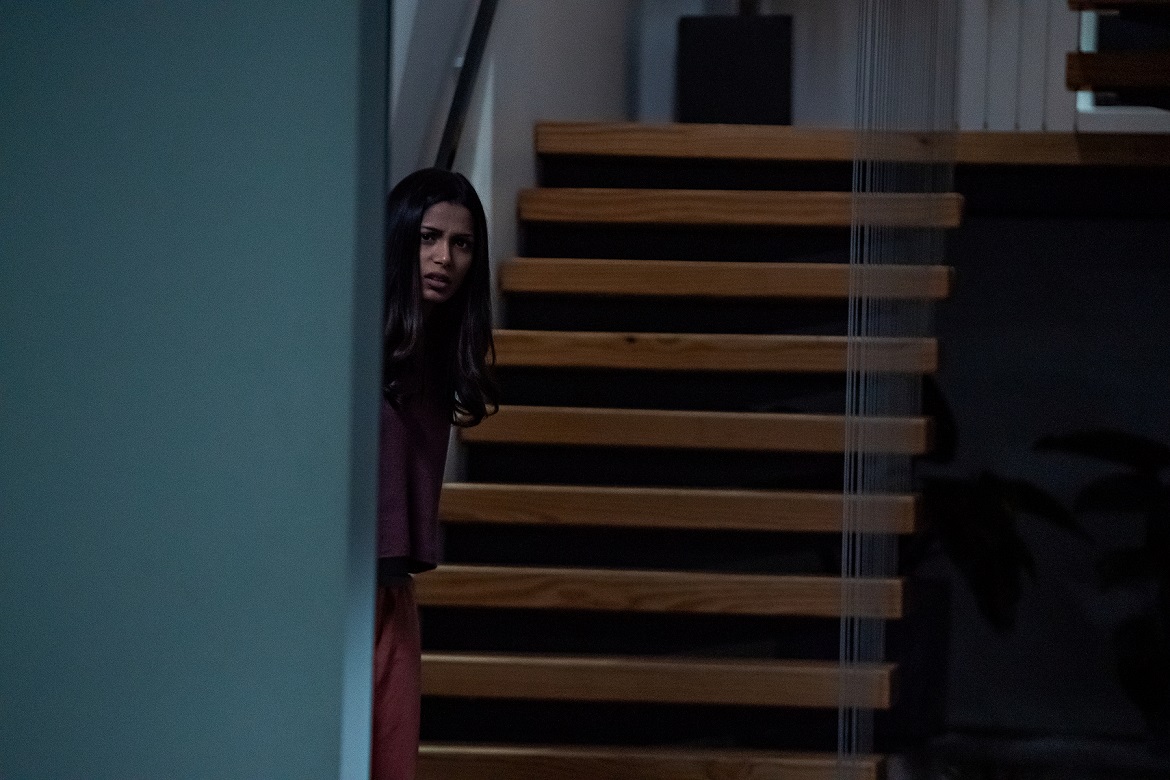
Intrusion
Netflix
Reviewed for Shockya.com by Abe Friedtanzer
Director: Adam Salky
Writer: Christopher Sparling
Cast: Freida Pinto, Logan Marshall-Green
Screened at: Critics’ link, NY, 9/21/21
Opens: September 22nd, 2021
Everyone wants to feel safe in their own home. There are degrees to which people worry about security, installing cameras, alarms, and motion detectors to ensure that their valuables and their wellbeing are protected from any malignant entities who might seek to do them harm. What’s worse than feeling like there is an external threat who might not be afraid of the law or advanced technology is the notion that what someone has to fear is already on the inside, incapable of being blocked out because it has no obstacles left standing in its way.
Meera (Freida Pinto) relocates to a small town with her husband Henry (Logan Marshall-Green) after successfully completing cancer treatments. They are both shaken when they return home one night to find that their lavish home has been burglarized, and the terror continues when the perpetrators return while they are home. Henry’s quick actions save their lives, but as Meera recovers from the trauma, her search for answers about why they were targeted leads her to potentially disturbing truths about her partner.
This hardly seems like the ideal time for a film that makes people question whether it’s safe to be inside their own homes, given the very present danger of leaving presented by the contagions known to exist outside. While Meera is not agoraphobic, she has just been through a health ordeal and could use positive experiences in her new home. That is not what this situation provides, and Meera’s increasing loneliness only adds to the constant state of anxiety she feels.
The environment that surrounds Meera is not exactly welcoming either. The detective (Robert John Burke) who comes to investigate has a bedside manner that is sorely lacking. He creates an adversarial relationship with Henry and does nothing to comfort Meera. Because she has recently relocated, she doesn’t have friends or family she can turn to for support, and the fact that others in town, like her doctor, have heard about the break-in doesn’t instill her with any more confidence since it only serves to make her feel like she’s the only one out of the loop.
This film belongs to a genre that doesn’t always produce the most substantial or well-plotted products, often leaning heavily on jump scenes and thin, less-than-plausible twists to propel the narrative. Recent examples include Fatale, which followed a different story but ultimately involved similar themes of trust and security, with law enforcement occupying a questionable space in relation to the two. Here, what’s most on display is Meera’s perception of her husband, which shifts gradually over the course of the film as she questions what she has always known and assumed about him.
There are additional parallels between this film and a top-tier entry that begins with a violent home invasion, Cold in July. This one doesn’t deliver nearly as emphatically on its premise, featuring a decent performance from Pinto, whose recent turn in the pandemic film Only makes far better use of her talents. Marshall-Green is an actor who has played many different roles and might actually be better suited as the man Meera worries Henry may be than the well-dressed socialite he initially presents himself to be. As Meera learns more of the truth, this film gradually becomes less convincing, capable of delivering moderate thrills and suspense but containing much less depth than its intrigue might suggest.
92 minutes
Story – C
Acting – B-
Technical – B-
Overall – C
